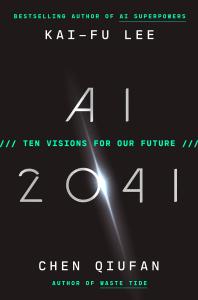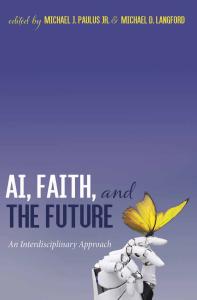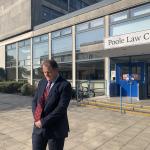The title of this post is the question Reid Hoffman, chair of the advisory board for Stanford’s new Institute for Human-Centered Artificial Intelligence, asks in a recent post with the same title.
“What could possibly go wrong?” is certainly an important question, but what Hoffman asks us to consider also is how we might “navigate to the best possible future.”
I’ve written a number of the posts here on narratives about technology, and I’m especially interested in eschatological ones that look beyond utopian and dystopian visions. Instead of (o)utopian—or “no place”—optimism, or dystopian negations, we need true and realistic hopes.
All of this was in mind as I read two rather different documents recently: the Southern Baptist Convention’s statement on artificial intelligence and the Pew Research Center report on Americans’ views of the future.

“Artificial Intelligence: An Evangelical Statement of Principles”
Some of my thoughts about the SBC statement appeared in Christianity Today’s coverage of it. I see this as an initially positive approach to AI, but many of the stated principles will have limited meaning or value for those outside this denomination—those who don’t read the Bible as an “inerrant” book (which can exclude an evolutionary understanding of technology and human nature), or who don’t share the basic beliefs of the SBC (and hold different views of eschatology, among other things).
In addition to hermeneutic and theological differences, others like Elias Kruger have pointed out the statement’s limited engagement with the technical complexities of autonomous and intelligent technologies.
In addition to these critiques, more needs to be said about hope for the future.
One section in the statement, which deals with perhaps one of the most important areas that will be impacted by AI—work—says little about the value of work and how the future of work may participate more fully in new creation.
The final section, on the future of AI, says very little about the future of AI. Affirmations of life, human dignity, and humane activity are asserted without much clarification, which leads to the odd denial that AI will not “make us more or less human.” From an evolutionary perspective, technology made us human. And as technology has advanced, we have become better humans—not perfect or perfectible, but better throughout the history of our species. One can agree that “Future advancements in AI will not ultimately fulfill our longings for a perfect world,” while at the same time affirming that technology—from the earliest lithic technologies to the latest advances in healthcare—has significantly enhanced us and can continue to do so.
“Looking to the Future, Public Sees an America in Decline on Many Fronts”
Bryan Alexander provides a helpful summary of and commentary on Pew’s report of Americans’ perception of the future at his site. Overall, it’s a bleak report: “Majorities predict a weaker economy, a growing income divide, a degraded environment, and a broken political system.” The report’s narrative of public pessimism may be muddled by the fact that, as Alexander points out, the report seems to blend what people thought “was likely to happen, and what they wanted to occur.”
There are great hopes that education, science, and technology will have a “positive impact in solving the nation’s problems.” Those hopes are belied by the reality that these things are means—neither neutral nor deterministic, but rather shaped by values and visions invested in them. These hopes are also somewhat contradicted by a fear of automation:
Relatively few adults see an upside for workers from automation and new workplace technologies … Looking forward, most Americans think automation will reshape the workplace—but not necessarily for the better. A large majority say, 30 years from now, robots and computers will do much of the work currently done by humans … Among those who say robots and computers will do much of the work currently done by humans in the future, most think this will be a bad thing for the country.
There are significant differences by race, age, and educational background, and one can find glimmers of hope among those who are open to a future that doesn’t look like the present. But a significant takeaway is that we need help imagining a future that will be transformed by new and emerging technologies.
Taken together, these two documents point to the need for greater reflection on and articulation of our hopes for the future, and the importance of asking the question: “What should go right?”
















